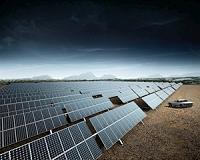 |
Asopia, Greece (AFP) Nov 14, 2010 The son and grandson of farmers, Spyros Papathanassiou spends most of the day overseeing his family olive press and winery in the outskirts of Asopia, a village northeast of Athens. But his future is invested in a fenced-off contraption in the hills outside the village -- a 5,800-square-metre solar farm on which Papathanassiou sank nearly half a million euros (dollars) three years ago. "Agricultural income has been severely restricted in recent years," says the 58-year-old former village mayor, shouting above the din of the olive press. "Essentially, this job has never been very profitable." Last year, this entrepreneur and civil servant completed the 450,000-euro (618,000-dollar) solar farm in a discarded family vineyard, some 90 kilometres (56 miles) from the capital. Though barely enough to power the local water drill, it is already helping his family supplement their income by selling electricity to the national grid. Papathanassiou hopes to repay his bank loans and break even in 4-5 years. With agriculture in Greece facing a bleak future from rising costs and falling produce prices, thousands of farmers now want to follow his example. Some 6,000 applicants have so far rushed to join a government-backed, self-financed programme unveiled this summer to sow solar farms in the Greek countryside. The programme offers both farmers and the state-owned electricity operator PPC, which controls most of the energy market, a way out of a looming impasse. Accustomed to depend on European Union subsidies for their crops, Greek farmers have progressively driven themselves into a corner by growing produce that the bloc can get more cheaply elsewhere, such as cotton and tobacco. The frequent sight of angry growers, dumping unwanted crops at ministries and blocking highways with their tractors is something the authorities would be glad to eliminate, particularly now, when the purse strings have tightened. Greece is in the midst of a deep recession following the debt crisis that saw the country reach the brink of bankruptcy earlier this year. Likewise, the PPC has for too long depended on its vast supplies of lignite, a form of brown coal, to fire up its power generators. Lignite is a major pollutant, and the PPC -- nearly half of whose electricity production comes from coal-fired plants -- is Greece's single largest offender in carbon dioxide emissions. So the investment in solar cells in Greece, a country that has abundant sunshine throughout the year, holds out promise both to the farmers and the power company. For the PPC, it is a chance to expunge its dirty past while helping the country meet its renewable energy quota, set at 20 percent of national electricity production by the end of the decade. The farmers meanwhile have a chance to boost their dwindling income with a steady source of funds that no longer requires back-breaking, round-the-clock labour. "This is the last chance to have a serious investment in the Greek agricultural sector," says farmer's union activist Vassilis Kollias. "Farm incomes have fallen by 40-50 percent in the last 15 years." "Most full-time farmers are over 50 years old, many of them without someone to pass the torch to. They have nothing else to look out for." Overall, the Greek environment ministry has said it will allow a capacity of 2.200 megawatts (MW) of solar energy-fueled power by 2020. Out of that threshold, farmers have been allotted a share of 750 megawatts. Farmers have been told to aim for a maximum of 100 kilowatts of power from each solar farm, which means the state can grant them up to 7,500 production licences. Not only does the interest from applicants far exceed this allowed capacity, but the farmers are having to contend with unforeseen difficulties. One worrying sign is that the price of electricity, currently 40 cents per kilowatt hour in Greece, has fallen to 25 cents in neighbouring Spain where a similar programme is already up and running, says Kollias. This can dampen enthusiasm at a time when the startup capital needed can be at least 25,000 euros, and as high as 80,000 euros, plus bank loans. Another is that the PPC does not actually have power lines in all the rural areas that want to join the supply grid, he adds. "It is a good idea, but it's been put together on the hoof," says Kollias. Most of the interest has come from the western Greek region of Agrinio, where many growers are struggling after the withdrawal of EU subsidies for tobacco, which had been their staple crop. "We have a lot of tobacco producers who have lost their income, so they are doubly interested," says Penelope Sidira, solar project supervisor at the Agrinio farmers' co-operative, which has received over 500 applications. "Besides, there's little else left for them here," she notes.
Share This Article With Planet Earth
Related Links All About Solar Energy at SolarDaily.com
 iSuppli Boosts 2010 Solar Installation Forecast
iSuppli Boosts 2010 Solar Installation ForecastEl Segundo CA (SPX) Nov 12, 2010 Stronger than expected growth in Germany has prompted iSuppli Corp. to boost its 2010 forecast for global installations of Photovoltaic (PV) solar systems. Worldwide installations in 2010 will amount to 15.8 Gigawatts (GW), up from iSuppli's previous outlook of 14.2GW. This will represent 118.7 percent growth from 7.2GW in 2009. iSuppli now forecasts that installations in 2011 will amount ... read more |
|
| The content herein, unless otherwise known to be public domain, are Copyright 1995-2010 - SpaceDaily. AFP and UPI Wire Stories are copyright Agence France-Presse and United Press International. ESA Portal Reports are copyright European Space Agency. All NASA sourced material is public domain. Additional copyrights may apply in whole or part to other bona fide parties. Advertising does not imply endorsement,agreement or approval of any opinions, statements or information provided by SpaceDaily on any Web page published or hosted by SpaceDaily. Privacy Statement |